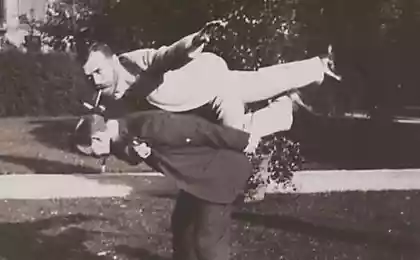415
In defense of comfort
Ninety million six hundred twenty two thousand seven hundred sixty four
The desire for comfort in Christianity is usually regarded as something improper. And it would be strange to challenge it: the whole history of Orthodox asceticism, essentially consists of convincing descriptions of voluntary deprivation is not that of comfort, but even the most basic amenities. Anything equal in power and depth of self-restraint, the world before Christianity did not know. For example, the famous philosopher and cynic Diogenes of Sinope lived in a barrel, I regret saying that can not give up mugs for drinking water, and wanted to be like an ordinary dog, which is neither in a circle nor in a barrel is not needed. Due to this extravagance, Diogenes entered the history of the ancient world as a pattern of asceticism. Where he is buried is not known. A memorial plate, dedicated to Diogenes, is in the several cities of Greece. On one of these boards in his hometown of Sinop, where the philosopher once expelled, is the following epitaph:
Time wears away the stone, and bronze,
But your words, Diogenes, will live forever!
After all, you taught us good to settle for less
And outlined the way towards a happy life!
But against the backdrop of St. Mary of Egypt, this Greek ascetic looks pampered sybarite and lover of refined pleasures. After all, he ate scraps from the city market, there is currently mined leftover wine, half-full merchants after a successful day, and the other small pleasures herself, though, and was content throughout, what is called the third grade, which, as you know, not a marriage.
Maria the Egyptian, repenting in the dissolute life, went into the wilderness, never to return to the people. There she spent thirty-seven years. Than she ate the sand like being saved from the heat and cold, – all this we will never know. Do we know about it only by chance (which, of course, not accidental). Shortly before his death Maria for the first time in all these years met in the Sands of man. It was a wandering monk Zosima, to whom she told the story of his life. By this time, Mary of Egypt has reached amazing heights of Holiness. Zosima saw how she crossed the river on the water, and during prayer was off the ground, and prayed, standing in the air.
In comparison with the level of rejection of all the worldly goods of St. Mary, of Sinope, the philosopher suffered a crushing and conclusive defeat.
And at the same time, strange as it may sound, both they and Diogenes, and Mary of Egypt used the comfort. After all, the Latin root from which comes this word literally means protection and consolidation. What is not such a strengthening was for Diogenes and his famous pithos – a large clay jug for wine, in which the philosopher spent the night and hiding from the midday sun? It is obvious that the pithos was provided by Diogenes a certain level of comfort
With St. Mary of Egypt is even more interesting. The fact that in English the word comfort is the main to refer to the Holy spirit. In the gospel the English word Comforter does not sound except as komforter. Abandoning the goods of this world, the Holy Mary of Egypt did not refuse at all from strengthening, comfort, and protection, that is, from comfort, in the literal sense. She only decided to ask for that comfort, and protection directly from God. And the Lord thirty-seven years kept her in the desert from all dangers threatening her.
Well, the understanding of comfort, which is now widely accepted, evidenced by our decision, on the understanding of protection and comfort, which formed the modern man. And probably there's nothing wrong with comfortable furniture, washing machines, air conditioners and refrigerators. These things really protect us from inconvenience, and can only thank their creators for the protection and strengthening. Concerned only one thing. Genuine property rights can be considered is that it cannot be taken away under any circumstances. Because of that, and complained Diogenes on their fragile possessions, and therefore threw his mug, seeing the Creek some kid drinking water from a handful. But from pythos to refuse was not able to. And certainly not able to refuse third-ensure the leftover food and wine that gave his life near the city market. it would be with him, he lost his comfort? And what will happen to us if we suddenly lose everything that makes our life so convenient and allows you to feel protected from life's hardships? published
Author: Alexander Tkachenko
Source: foma.ru/v-zashhitu-komforta.html
The desire for comfort in Christianity is usually regarded as something improper. And it would be strange to challenge it: the whole history of Orthodox asceticism, essentially consists of convincing descriptions of voluntary deprivation is not that of comfort, but even the most basic amenities. Anything equal in power and depth of self-restraint, the world before Christianity did not know. For example, the famous philosopher and cynic Diogenes of Sinope lived in a barrel, I regret saying that can not give up mugs for drinking water, and wanted to be like an ordinary dog, which is neither in a circle nor in a barrel is not needed. Due to this extravagance, Diogenes entered the history of the ancient world as a pattern of asceticism. Where he is buried is not known. A memorial plate, dedicated to Diogenes, is in the several cities of Greece. On one of these boards in his hometown of Sinop, where the philosopher once expelled, is the following epitaph:
Time wears away the stone, and bronze,
But your words, Diogenes, will live forever!
After all, you taught us good to settle for less
And outlined the way towards a happy life!
But against the backdrop of St. Mary of Egypt, this Greek ascetic looks pampered sybarite and lover of refined pleasures. After all, he ate scraps from the city market, there is currently mined leftover wine, half-full merchants after a successful day, and the other small pleasures herself, though, and was content throughout, what is called the third grade, which, as you know, not a marriage.
Maria the Egyptian, repenting in the dissolute life, went into the wilderness, never to return to the people. There she spent thirty-seven years. Than she ate the sand like being saved from the heat and cold, – all this we will never know. Do we know about it only by chance (which, of course, not accidental). Shortly before his death Maria for the first time in all these years met in the Sands of man. It was a wandering monk Zosima, to whom she told the story of his life. By this time, Mary of Egypt has reached amazing heights of Holiness. Zosima saw how she crossed the river on the water, and during prayer was off the ground, and prayed, standing in the air.
In comparison with the level of rejection of all the worldly goods of St. Mary, of Sinope, the philosopher suffered a crushing and conclusive defeat.
And at the same time, strange as it may sound, both they and Diogenes, and Mary of Egypt used the comfort. After all, the Latin root from which comes this word literally means protection and consolidation. What is not such a strengthening was for Diogenes and his famous pithos – a large clay jug for wine, in which the philosopher spent the night and hiding from the midday sun? It is obvious that the pithos was provided by Diogenes a certain level of comfort
With St. Mary of Egypt is even more interesting. The fact that in English the word comfort is the main to refer to the Holy spirit. In the gospel the English word Comforter does not sound except as komforter. Abandoning the goods of this world, the Holy Mary of Egypt did not refuse at all from strengthening, comfort, and protection, that is, from comfort, in the literal sense. She only decided to ask for that comfort, and protection directly from God. And the Lord thirty-seven years kept her in the desert from all dangers threatening her.
Well, the understanding of comfort, which is now widely accepted, evidenced by our decision, on the understanding of protection and comfort, which formed the modern man. And probably there's nothing wrong with comfortable furniture, washing machines, air conditioners and refrigerators. These things really protect us from inconvenience, and can only thank their creators for the protection and strengthening. Concerned only one thing. Genuine property rights can be considered is that it cannot be taken away under any circumstances. Because of that, and complained Diogenes on their fragile possessions, and therefore threw his mug, seeing the Creek some kid drinking water from a handful. But from pythos to refuse was not able to. And certainly not able to refuse third-ensure the leftover food and wine that gave his life near the city market. it would be with him, he lost his comfort? And what will happen to us if we suddenly lose everything that makes our life so convenient and allows you to feel protected from life's hardships? published
Author: Alexander Tkachenko
Source: foma.ru/v-zashhitu-komforta.html
The philosophy of permaculture
Chapatis and Alu Preparations : we prepare traditional Indian flat bread























